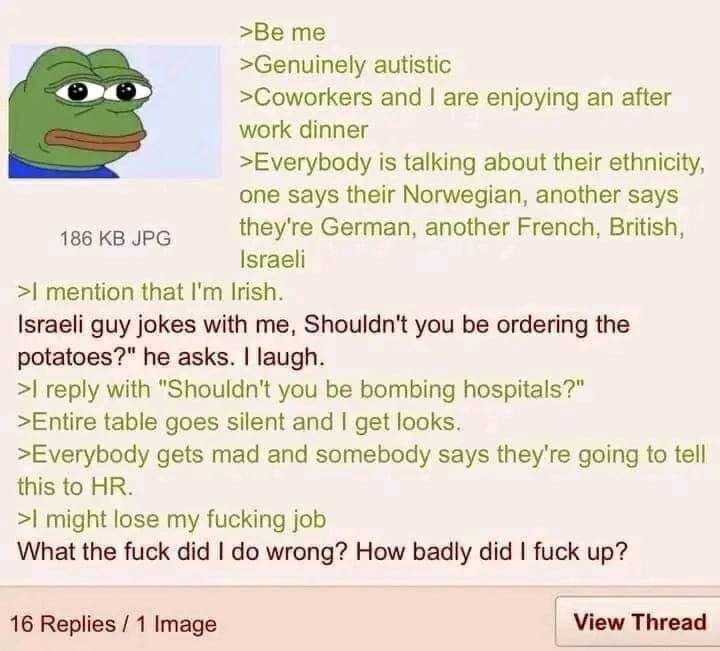this post was submitted on 21 Sep 2024
937 points (97.3% liked)
Greentext
6387 readers
1691 users here now
This is a place to share greentexts and witness the confounding life of Anon. If you're new to the Greentext community, think of it as a sort of zoo with Anon as the main attraction.
Be warned:
- Anon is often crazy.
- Anon is often depressed.
- Anon frequently shares thoughts that are immature, offensive, or incomprehensible.
If you find yourself getting angry (or god forbid, agreeing) with something Anon has said, you might be doing it wrong.
founded 2 years ago
MODERATORS
you are viewing a single comment's thread
view the rest of the comments
view the rest of the comments

Wasn't the potato famine a natural disaster though?
The potato blight was a natural disaster.
The famine was caused by the British exporting the same amount of potatoes out of Ireland as before.
They didn't export potatoes out of Ireland, they exported everything else. Meaning there was no other food but potatoes for the Irish to eat.
That, the rent system, and the British actively preventing aid (not at their expense!) really turned a bad situation into a full-blown genocide.
Also, monoculture, but yeah. Points at Cavendish bananas.
The Irish at the time also grew wheat and meat and everything else that was grown on the British Isles back then. The problem was the colonising English owned all the land and exported all the food
Potatoes were the emergency food, the only thing Irish could grow and eat
When Irish were dying of starvation the farms they were forced to work were growing plenty of wheat and sheep
Ahh, I see.
Not entirely. Yes there was blight affecting crops but there was more to it than that.
Huge volumes of unaffected produce were exported to England for profit - the decreased yields only impacting the market for locals. Previous famines has seen the British ban exports to ensure the local population had access to food (which also decreased the prices) but not this time around.
English landlords of Irish property were evicting their tenants who weren’t able to pay (since the blight impacted many people’s ability to work) with zero notice or rights for the tenants. Absentee landlords were extracting huge amounts of capital out of the Irish economy, owning vast swathes of the entire country.
The Irish were widely dependent on the potato as a primary form of sustenance but it was due to the potato being high in calories, cheap and easy to grow, and high density yields from relatively small plots of land (landlords dividing up the land into incredibly small divisions whilst simultaneously extracting the highest rent possible for the land).
The Irish were, in essence, forced to eat potatoes due to the extreme economic exploitation they were subject to.
Yet there was no aid from England; she simply sat by reaping profit and leaving things up to the divine - “the market will provide”. There had been efforts to change tariffs and laws but the contention in the governing party about providing aid caused the Prime Minister to resign and the subsequent government threw out all efforts (except those such as offering relief to those without land which forced many Irish to sell what land they had to gain relief and aid).
A Prime Minister at the time launched a commission to investigate and it was found that the absentee landlord system was abhorrent and principally responsible for the famine.
Sadly 1/4 of the population perished, and another 1/4 simply left the country. In some ways, Ireland never recovered.